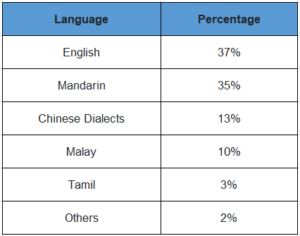Your cart is currently empty!

What Language Is Spoken In Singapore?
Singapore, a vibrant and multicultural city-state, is known for its rich linguistic landscape.
From the perspective of a self-sufficient traveler, you will probably be interested in what language to communicate in, and whether when you come to Singapore, will you have any difficulties communicating with native speakers. So, What Language Is Spoken In Singapore?
Don’t worry too much, the statistics below will help you be more confident when traveling on your own in Singapore.

Accordingly, as long as you know English or Chinese, you can comfortably travel to Singapore. Especially, the younger generation all use English as their mother tongue. In this article, we will explore the languages spoken in Singapore, the country’s language policies, and the cultural significance of its multilingualism.
Historical Context
To understand Singapore’s linguistic diversity, it’s essential to consider its historical context. Singapore’s indigenous population was originally of Malay origin but was long under British rule. After the British landed in 1819, traders came from China, India, and Sri Lanka… and the multi-ethnic and multi-lingual culture clearly shows this today.
Even in addition to the four official languages, Singaporeans also use many other dialects and minority languages despite many government efforts to eliminate them, creating a common language unity.
Official Languages
Singapore recognizes four official languages: English, Malay, Mandarin, and Tamil. This policy reflects the ethnic and cultural diversity of its population. Because of bilingual education policies, most people speak two or more languages – usually English, their ethnic mother tongue, and possibly others.
- English
English, a legacy of British colonial rule, serves as the lingua franca in Singapore. It is the medium of instruction in schools and the primary language of administration, business, and technology. English unites the ethnically diverse population, facilitating communication and integration. English is the most commonly spoken language in Singapore’s urban core, serving as a lingua franca for the country’s ethnically diverse population (and is also the primary language used in business). This was partly a deliberate attempt to bring economic benefits to the country after independence in 1965. Singaporeans are classified as English speakers (not native speakers) 5th best in the world.
Singaporean English, also known as ‘Singlish’, is a unique colloquial form of English blended with elements from other local languages and dialects. However, the Singapore government has discouraged the use of that language, similar to its treatment of the Chinese dialect. Since 2000, the government’s “Speak Good English Movement” has promoted English as more appropriate than Singlish.
- Malay
Malay, the national language of Singapore, holds a symbolic and cultural significance. It is associated with the Malay community, which is indigenous to the region. Malay is used in the national anthem, military commands, and some official ceremonies, reflecting the country’s historical roots and cultural heritage.
- Mandarin
Mandarin serves as the lingua franca among the Chinese community, which forms the majority in Singapore. The government’s ‘Speak Mandarin Campaign’ in the 1970s and 1980s aimed to promote Mandarin over other Chinese dialects to strengthen ethnic identity and ensure easier integration into the modern economy. This policy also aligned Singapore with the rising global and economic importance of China.
- Tamil
Tamil represents the Indian community in Singapore. Tamil, one of the oldest languages in the world, is taught in schools and used in media and cultural activities. The Indian community in Singapore also speaks other languages such as Hindi, Bengali, Punjabi, and Gujarati, reflecting the diversity within the Indian diaspora.
According to Ethnologue, unofficial Singaporean languages and dialects include Bengali, Hakka, Min Bei, Min Dong, Min Nan, Pu-Xian, Yue, Gujarati, Hindi, Javanese, Madura, Malayalam, Orang Seletar, Punjabi, Sindhi, Singaporean Sign Language, Sinhala and Telugu. There was a campaign in 1979 to promote Mandarin to the exclusion of other Chinese dialects, partly to unify Singapore’s Chinese community and also to increase its competitiveness in the global business.
Multilingual Education System
Singapore’s education system plays a crucial role in its language policy. Students learn English as their first language and are encouraged to study their mother tongue (Malay, Mandarin, or Tamil) to maintain their ethnic heritage and cultural values. This bilingual education policy aims to prepare students for the global stage while preserving their cultural roots.
Social and Cultural Impact
The multilingual environment of Singapore has a profound social and cultural impact. It fosters a sense of multiculturalism and national identity among Singaporeans. The ability to speak multiple languages is not only practical in daily life but also a source of pride and cultural richness.
Challenges and Adaptations
Despite the advantages, Singapore’s multilingual landscape presents challenges. Balancing the dominance of English with the preservation of mother tongues and cultural identities requires continuous effort. Moreover, the younger generation’s preference for English has raised concerns about the erosion of linguistic diversity and heritage languages.
The Future of Languages in Singapore
Looking ahead, Singapore continues to adapt its language policies to meet the changing socio-economic needs while striving to preserve its linguistic heritage. The rise of digital media and global communication platforms may influence language use and preferences among the younger population.
In conclusion, the linguistic landscape of Singapore is a testament to its historical, cultural, and social evolution. The coexistence of multiple languages not only facilitates communication and integration but also enriches the cultural fabric of the nation. Singapore’s approach to managing its multilingual environment, while challenging, offers valuable insights into the importance of language in nation-building, cultural identity, and global connectivity. As Singapore continues to evolve, its commitment to linguistic diversity and multicultural harmony remains a key aspect of its unique identity on the world stage.
